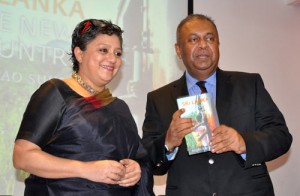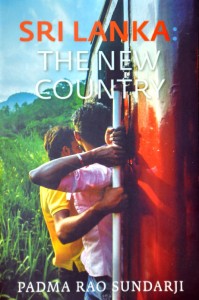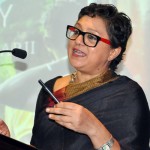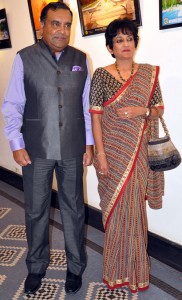What about the ‘dynamic’, ‘resurgent’ and ‘peaceful’ Sri Lanka?
One of the things that irritates Padma Rao Sundarji most about the way Sri Lanka is portrayed in international media is the description of an island 650,000 sq. km large as a “tiny teardrop,” or as a serendipitous ‘Inselparadies’ (island paradise) – these and a ‘million other clichés’ leave her exasperated by their laziness.
To her credit, Sundarji chose to launch her book about Sri Lanka, in Sri Lanka –a counterpoint to a few other recent publications about the island that weren’t even made available in local bookshops for months after their international release. In a speech at the event, the author began by asking and then answering her own question: “There are books and books and books on Sri Lanka. Of late, mostly by foreigners like myself. So why did I have to add to that heap?” She told an audience that included India’s High Commissioner Y.K. Sinha, that international scrutiny of the last phase of war had been marked by a clear bias on the part of the media.
“Let’s run through some of the adjectives in the titles alone: ruined, troubled, caged, divided, bloody, conflict-ridden, disastrous, destructive, etc. While most of these descriptions are true of the 30-year-long separatist war within Sri Lanka – sixteen of which I covered from close quarters and very intensively, my own travels through SL after the war, i.e, from May 2009 to the present gave me a very different picture,” she told the  audience.
audience.

Long links with Sri Lanka: Padma Rao Sundarji at the book launch. Pix by Indika Handuwala
Her own choice of adjectives were markedly different, ranging from ‘dynamic’ to ‘resurgent’ and, “most importantly, ‘peaceful’.”
The one time South Asia bureau chief of the German news magazine Der Spiegel, Sundarji can claim a long intimacy with Sri Lanka. She puts her networks and know-how to good use to present an impressively diverse collection of interviews in Sri Lanka: the New Country. We hear from former Tamil Tigers (including the likes of V. Prabhakaran, ‘Daya Master’ and K. Pathmanathan) as well as Sri Lanka Army Generals (Major General Udaya Perera), chief ministers (C. V. Vigneswaran), and also as the blurb promises ‘ordinary Sri Lankans…princes, ‘secular clergymen’, Tamil Buddhists, Sinhalese, Tamils, politicians and sailors wary of ghosts.’
Sundarji’s analysis of key players and strong opinions are likely to divide readers sharply along the lines of their political predilections: she has sat down with former President Mahinda Rajapaksa, whom she describes as a “superb tactician,” admitting readily “that I have not, over all these years, found enough reason to dislike Mahinda Rajapaksa or the extended family either.” In her interview with K. Pathmanathan, once the chief procurer of arms for the LTTE, she finds him living a life seemingly free of government surveillance and equally bewildering, in charge of three orphanages with 300 children in them.

Distinguished guests: With Mangala Samaraweera (top right) and Indian High Commissioner V.K. Sinha and Mrs. Sinha
KP professes himself a strong advocate of reconciliation, blaming sections of the diaspora and ambitious local politicians almost exclusively for promoting further conflict. Speaking of the seemingly unrelenting pressure from the international community on human rights violations during the war, he tells Sundarji: “It is because of the presence of these influential pro-Eelam diaspora members that the governments of their adopted countries don’t listen. They close their eyes and ears, knowing very well that progress is being made here by leaps and bounds.”
Sundarji’s interviewees apologise to her before they point out what they see as the hypocrisy of South Indian politics. One journalist from the north tells her, “Curry leaf politics, we call them here! Like the curry leaf, they throw us into the recipe when it suits them, and pick us out again when they don’t need us.”
Though she never hesitates to ask the difficult questions, Sundarji does not hide where her own sympathies lie. She states quite clearly in her introduction her interest in telling ‘the other side’ of the story: “And since not many attempts have been made to speak to the Sri Lankan army which continues to be depicted as a kind of nameless, faceless bully force, hungry for power over and colonization of the north and east Sri Lanka, there are debates with the brass of the army who commanded the last phase of the war too,” she writes.
In writing a book, Sundarji has also found room to juxtapose serious political interviewswith unusual ‘colour stories’ – from Tamil Buddhists in Jaffna (to whom she dedicates a whole chapter) to an exploration of her own history with the island. She refers to her grandmother, who along with her grandfather, lived in Sri Lanka for a spell while the latter worked as chemical engineer here. “According to her, the tea, the biscuits, the furniture, coconuts, people, ice cream, temples – ‘everything was better in Ceylon,’”, writes Sundarji.
Sundarji spoke to the Sunday Times briefly before the launch of the book with Minister of Foreign Affairs Mangala Samaraweera in attendance. She kept her love and admiration for Sri Lanka front and centre. “I didn’t want to write on Sri Lanka unless I was absolutely certain that this was what I wanted to say,” she emphasises.
Acknowledging that there is likely truth to the charges of human rights violations laid at the government’s door both during and after the war, she says she nevertheless wanted to report in a way that acknowledged the many complexities of the situation on the ground. She concluded: “Undoubtedly, armies here are guilty of human rights violations, of overstepping the line sometimes. The allegations obviously need to be investigated and if found guilty the culprits need to be brought to book. The thing is that that is not all there is to Sri Lanka.”
In the final pages of her book, Sundarji meets an ex-LTTE cadre who asks her hesitatingly if Prabhakaran is still alive. Their conversation seems a distillation of all the others that have come before it in the book, another forthright statement of her politics. The young man says he has seen films made in India that claim the LTTE’s leader escaped in the final days of the war. “I just want to know who is telling the truth,” he says, “our army or those DVDs?” Sundarji doesn’t try to answer him, instead she gives him some advice: “I told him he should forget about it and get on with his life, now that there was samadhanam [peace].”
Later she sees the former cadre exchange a hug with a former soldier of the Sri Lankan army, with whom he is friends. “This,” she says, “is Sri Lanka, the new country.”


